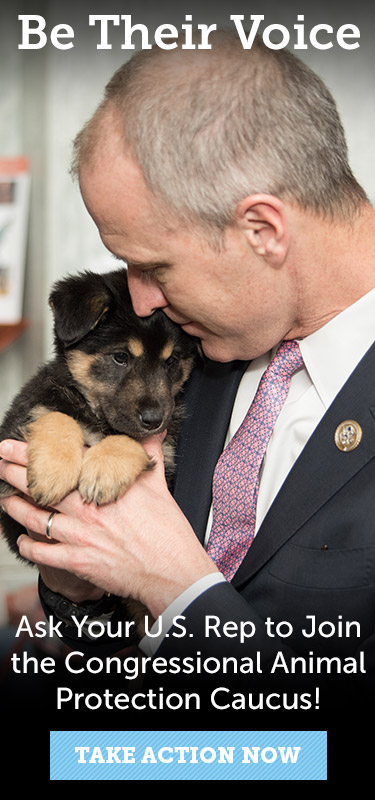Better Laws for Animals—Check Out 2023’s Big Wins!

As the last 12 months flew by, ASPCA advocates throughout the country used their voices to protect farm animals, farmers, horses, companion animals and pet owners. As a result, 2023 was packed with major milestones, from the passage of stronger animal-protection laws to the defeat of bad measures that would have jeopardized the safety and well-being of animals.
Here are last year’s most impactful legislative victories we supported, thanks to the help of animal advocates like you:
Arizona and California passed laws to expand access to veterinary telemedicine. While telehealth is widely used in human medicine, veterinarians have been unable to fully employ the same tactic—even though it would have tremendous benefits for animals and their owners., The ASPCA is working hard to change that. These new laws enable veterinarians to establish relationships with clients through video technology and continue using that technology to deliver safe and effective veterinary care. Learn more about veterinary telemedicine >
Colorado passed a law that will make it easier to find pet-friendly housing. This new law will limit the amount a landlord can charge for pet-related fees, like deposits and pet rents, to prevent them from becoming housing barriers. It will also prohibit insurance companies from having discriminatory coverage and pricing policies based on dog breed. Learn more about our efforts to remove barriers to pets in housing >
Independence, Missouri, finally repealed its decades-old breed ban. In June, the Independence City Council voted to lift the city’s pit bill ban after hearing from the public about its negative impacts. The decision went into effect in August, meaning families there are no longer at risk of being separated from their beloved pets. Learn more about breed-specific policies and more humane alternatives >
New York legislators designated $5 million of the state’s budget to New York’s Companion Animal Capital Fund to ensure the well-being of homeless animals. The Companion Animal Capital Fund supports animal shelters across New York State, providing critical funding for operations, maintenance, special projects and more. Animal shelters and the local governments they serve rely on this funding to responsibly care for homeless, abused and at-risk animals.
New laws in California and Nevada will ensure that families with pets can safely evacuate during a disaster. Now in effect, both new laws require local governments to designate at least one pet-friendly sheltering site in each impacted county and, in some cases, each impacted city during weather-related emergencies. Nevada’s law also requires officials to develop plans for the evacuation, transport, and sheltering of people with pets. Thankfully, Californians and Nevadans will no longer face the devastating choice between seeking safety and staying with their beloved pets.
Colorado and Indiana took action to protect animals housed in overnight boarding centers, animal shelters, veterinary hospitals and other facilities. The Pet Animal Care and Facilities Act (PACFA) is Colorado’s existing program to protect the health and well-being of pets in facilities throughout the state. In 2023, this program began requiring shelters to have evacuation plans for natural disasters. Similarly, Indiana passed legislation to require kennels and other facilities with animals to have fire safety measures in place to prevent pets from suffering or perishing in fires.
A new federal rule will improve protections for the millions of animals raised on USDA Organic farms. The U.S. Department of Agriculture (USDA) finalized the long-overdue Organic Livestock and Poultry Standards (OLPS) Rule to close dangerous loopholes in the National Organic Program. Following more than a decade of advocacy from farmers, consumer-protection organizations and animal welfare groups, anyone raising animals under the USDA Organic program must adhere to stronger welfare standards, including offering animals access to the outdoors. The new requirements will finally prohibit cruel practices like debeaking birds, docking the tails of pigs and putting mother pigs in gestation crates.
The U.S. Supreme Court upheld California’s Prop 12 banning extreme confinement of farm animals. The ASPCA submitted an amicus brief in support of Prop 12 urging the Supreme Court to uphold this important and popularly enacted welfare policy that prohibits cruel confinement methods in both the raising and sales of animal products. This victory offers hope that such callous treatment of animals on factory farms can finally come to an end.
New Jersey also banned the extreme confinement of farm animals. Until now, it was permissible for animals to be kept in cruel gestation crates and veal crates on New Jersey farms. These brutal practices have already been rejected now by 14 other states, including Maine, Massachusetts and Rhode Island, and this latest victory is another step forward in building a more humane food system. Learn more about farm animal confinement bans >
Oregon passed a law increasing regulation of factory farms. Though the ASPCA and our allies were pushing for a complete ban on new factory farms in the state, the new law creates important regulations around factory farm groundwater usage and waste disposal and provides protections for Oregonians living near these inhumane facilities. Learn more about how factory farms hurt rural communities >
New York City brings relief to packed animal shelters by banning the sale of guinea pigs in pet stores. New York City has seen a surge of guinea pigs who were abandoned or surrendered to animal shelters. This new law will encourage adoption of the city’s homeless guinea pigs and ensure that people who bring home guinea pigs receive more support and information about their care. This victory comes just one year after New York passed a state law banning the retail sale of dogs, cats and rabbits in pet stores
Efforts to reverse local pet sale bans in Indiana and Missouri were defeated. Missouri has been home to the most puppy mills in the country for 10 consecutive years. Indiana also has a major puppy mill problem. Last year, lawmakers in both states introduced legislation that would have exacerbated these issues and made it harder to regulate the sale of animals in pet stores. Fortunately, both bills were defeated!
Residents of Orange County, Florida, said NO to puppy mills. Last year, the Orange County Board of Zoning Adjustment considered a proposal that would have allowed the construction of a new commercial dog-breeding facility in Orange County—despite a county law that aims to prevent puppy mill cruelty by prohibiting the retail sale of dogs. Residents fought back and the Zoning board denied the proposal.
In the final weeks of 2023, New York’s Governor signed a law prohibiting the sale of horses for slaughter. Americans overwhelmingly oppose horse slaughter, but thousands of American horses are trucked over our borders each year to slaughter facilities in Mexico and Canada. New York’s horses have likely faced an even greater risk because of their proximity to Canada. Passing this historic bill gives at-risk horses in the Empire State the chance to find humane care and loving homes.
New Mexico took steps to better protect horses. A new state law changed outdated rules that automatically sent homeless or seized horses to public auction, instead ensuring that nonprofit equine rescues have the "right of first refusal" to help these vulnerable equines and ensure they are given humane care instead of potentially being harmed or sent to slaughter.
With the New Year comes new opportunities to help prevent cruelty and improve laws for animals. Your voice is absolutely essential in these efforts. Here are two actions you can take today to make a difference in 2024:
- Help Defeat Attacks on Protections for Farm Animals! Email your members of Congress and urge them to oppose two bills that would be catastrophic for animals across the country.
- Join the ASPCA’s Mobile Action Team to stay informed of breaking news and urgent actions you can take to advocate for animals in your community and beyond.
- Become an ASPCA Advocacy Volunteer to help mobilize other animal advocates and improve laws for animals. Check out our three distinct volunteer teams and apply for one today!

